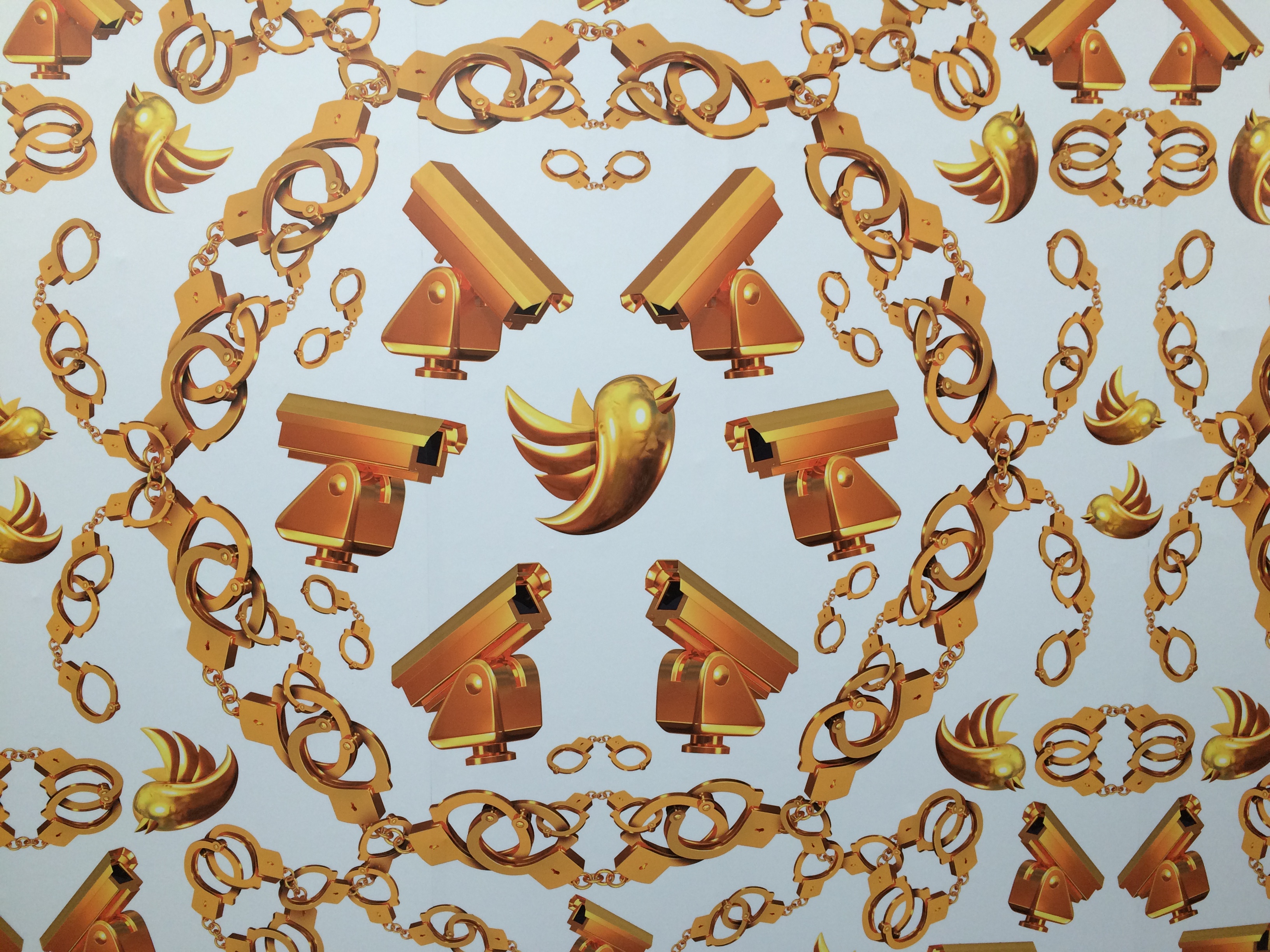Weekly Notes: legal news from ICLR – 18 September 2015
The latest buffet of legal news and events includes confusion over sex cases, the heroic resistance of art to official state stupidity, and links to some interesting reading and lectures. And over the next week Team ICLR is in Berlin, to record its impressions of international librarianship. Ai Weiwei at the RA Prisoner of conscience makes art… Continue reading
The latest buffet of legal news and events includes confusion over sex cases, the heroic resistance of art to official state stupidity, and links to some interesting reading and lectures. And over the next week Team ICLR is in Berlin, to record its impressions of international librarianship.
Ai Weiwei at the RA
Prisoner of conscience makes art that challenges official state stupidity

The Chinese artist Ai Weiwei has been subject to intense and intensive surveillance, scrutiny and harassment, as well as spells of actual imprisonment, for his art. It is not just any old art, though. It is art which constantly challenges the official version – whether that official version is the one preferred by the Chinese state and its calcified one-party dictatorship, with all the local corruption that engenders; or that of the self-appointed legislators of the art world and their market-making sidekicks.
The image reproduced here, from his current show at the Royal Academy in London, is typical of his playfulness with both form and content. It is a section of a wallpaper pattern, but it could equally be used on a silk scarf (and you can buy one from the gift shop).
Among the other exhibits are tables and stools which he has refashioned into potently symbolic but practically useless objects; a map of China with all its provinces detailed in cloisonne like the cheap tourist jewellery you get in China now; a gas mask (see image), a surveillance camera and a baby stroller in a field of grass all executed in polished marble; a set of painted pots; and a chandelier made of recycled bicycles. But the one that really lingers in the mind is his response to the failure of the Chinese state to acknowledge the child victims of a terrible earthquake in Sichuan province in 2008 which levelled a large number of schools. It was only after Ai Weiwei and local activists took the trouble to collect all the names, ages and school details of all the child victims of the earthquake that the government reluctantly produced any sort of figure of the number who died.
Another exhibit depicts in a series of dioramas the artist’s own incarceration by the Chinese authorities. He cannot eat, use the bathroom or read a book without soldiers standing over him, an intrusive reminder of the state’s power to limit his freedom of movement and expression. Interviewed on Channel 4 News, Ai Weiwei was asked by Jon Snow why the state persecutes him so. “I think art is always dangerous,” he replied.

What’s sex got to do with it?
Confusion over mental element of sexual offences
One case widely discussed this week highlighted the problem with the mental element in sexual offences. Specifically, the issue of consent. How much accurate information should I need to have before consenting effectively to sexual activity?
Gayle Newland, 25, has been convicted of three counts of sexual assault against a woman, also 25, who had believed she was in a sexual relationship with a man. Commenting on the case, Samantha Pegg, Senior Lecturer, Criminal Law, Nottingham Trent University in the Independent notes that the sexual interaction in the two-year relationship, which began on Facebook, involved the use of a prosthetic penis by Newland and a blindfold by the victim, and the victim “vigorously disputed” that there had been any “confusion about sexual orientation” or that there had been “role play” involved.
Pegg notes how, in a previous case, Justine McNally, 18, also presented herself as male to engage in sexual activity, and was sentenced to three years for six counts of sexual assault after “pretending” to be a boy to seduce a 16-year-old girl. Section 74 of the Sexual Offences Act 2003 provides that “a person consents [to sex] if he or she agrees by choice, and has the freedom and capacity to make that choice”. The question is how meaningful that consent can be if based on a fundamental misconception about the partner’s true gender. But is that or should that be the only kind of vitiating deception?
Many people tell lies to get partners into bed, from the fact that their wives don’t understand them to whether or not they even have wives. None of this seems to matter. Nor, crucially, does it seem to matter if you’re actually an undercover cop, and not a political activist as you pretend to be: as in the so-called Spycops cases, as solicitor Harriet Wistrich points out in The Guardian, in a piece entitled Gayle Newland behaved no worse than rogue undercover police officers. So if someone will not be prosecuted for pretending not to be an undercover policeman, why should they be prosecuted for pretending to have testicles and a penis when in fact they don’t? It seems potentially rather less of a harmful deception than, say, saying “I’ll be careful”, and then failing to withdraw.
Are white girls easy?
Should sentencing policy recognise cultural prejudice about maritable purity and unsullied chattelhood?
Refusing leave to appeal against the sentence imposed on Jamal Muhammed Raheem Ul Nasir for his assaults on two under-age girls, Walker J was reported by Owen Bowcott in The Guardian this week as having said that Asian victims of child sex crimes suffer more than white children and their attackers should accordingly be punished more severely.
Ul Nasir, 32, was jailed for a total of seven years at Leeds crown court in December last year, after being convicted of two counts of sexual assault on a child under 13 and four counts of sexual activity with a child. The judge, Sally Cahill QC, specifically said that the fact the victims were Asian had been factored in as an “aggravating feature” when passing sentence. She explained at the time that the victims and their families had suffered particular shame in their communities because of what they had endured. There were also cultural concerns that the girls’ future prospects of being regarded as a good candidate for arranged marriages could be damaged.
Walker J, sitting with Laws LJ and Mitting J, at London’s Royal Courts of Justice, reportedly concluded:
‘There is no basis for saying that Judge Cahill adopted an incorrect starting point. This application for leave to appeal against sentence must be refused.’
This seems to be in line with a new sentencing guidelines which is focussed less on a checkbox listing of body parts touched and more on the psychological effects on the victim, although they do not specifically refer to race or ethnic background. However, it does rather beg the question whether, if the victims were white – and culturally less likely to be packaged off in an arranged marriage, or subject of cultural prejudices which would treat them as less “pure” in a “sullied goods” kind of way, in other words like a chattel – their equivalent ordeal and victimhood would have attracted a lower sentence against the perpetrator.
This is on top of the likelihood that, being white, their complaints, if made to the police, would simply have been dismissed, as so many have been, on the basis that they were “slappers” who were “asking for it”. (This was a key emergent from the Rochdale scandal, according to the MP Simon Danczuk.)
The question is not whether sentencing policy should uphold and reinforce cultural prejudices about the “value” of girls preserved as an unsullied chattel to be married off advantageously, but rather, whether any girl should be treated as worth a lesser sentence for being raped or assaulted by a predatory male of whatever racial background. It seems on this occasion that a potentially aggravating factor was considered in isolation not only from other factors in the case but also from what it might say on the other side of the coin. It was presumably not a fully reasoned judgment in the Court of Appeal, being only a refusal of leave, but perhaps it should have been not only fully reasoned, but more carefully considered.
UPDATE: the judgment is now available: see paras 8 and 9. I have slightly amended my comments above, but do not feel a wholesale revision is called for.
On the reading list
Google versus the Competition (Commissioner)
Europe is targeting Google under antitrust laws but missing the bigger picture
Julia Powles, always worth reading, in The Guardian discusses the current investigation into anti-competitive behaviour by the web’s most popular search engine being conducted by Margrethe Vestager, EU Commissioner for Competition; and asks whether economic competition law is really the appropriate battle field for containing Google’s dominance in the search engine market.
I Fought the Law: Paul Gambaccini’s Clash with the Cops
Paul Gambaccini and the bigger picture
Kate Goold on The Justice Gap discusses the flaws and inequities in the way police arrested, publicly shamed and rendered unemployable, and then didn’t charge the DJ over historic sex offences based on unreliable evidence. And the fallout and upside in terms of bail reform.
Dates and deadlines
Free lectures at Gresham College
- Weds 7 Oct 2015 – 6:00pm Gaza-Israel: The Legal and the Military View
Free, first come first served. Location: Barnard’s Inn Hall
Speaker: Professor Sir Geoffrey Nice QC - Weds 28 Oct 2015 – 6:00pm: Free Speech and the Study of History
Free, first come first served. Location: Museum of London
Speaker: Timothy Garton Ash
Events
IALL (I am a camera)
It is too soon to say, like Christopher Isherwood, “Farewell to Berlin”, since the ICLR team has only just arrived. We’re here for the annual conference, or “course”, of the International Association of Law Libraries (IALL). We’re looking forward to meeting some friends old and new in the legal information world. And this camera will simply be recording impressions in the days to come.

That’s it for now. If I have time I’ll add some more photos or an update in the next few days.
This post was written by Paul Magrath, Head of Product Development and Online Content at ICLR. It does not necessarily represent any views of ICLR as an organisation.